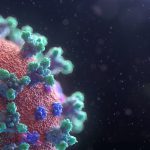COVID-19 May Lead to Delirium and PTSD
Node Smith, ND
People taken ill by coronavirus infections may experience psychiatric problems while hospitalized and potentially after they recover, suggests an analysis of past research led by the UCL Institute of Mental Health with King’s College London collaborators.
Compiled results from short- and long-term studies of people hospitalized by recent coronaviruses, MERS, and COVID-19
The systematic review paper, published in The Lancet Psychiatry, compiled results from short- and long-term studies of people hospitalized by recent coronaviruses, namely SARS (Severe acute respiratory syndrome) in 2002-2004, MERS (Middle East respiratory syndrome) in 2012, as well as COVID-19 this year.
COVID-19 is caused by the SARS-CoV-2 virus, a type of coronavirus. Some coronaviruses only cause mild symptoms of the common cold, but SARS-CoV-2 can cause severe respiratory illness, as did SARS-CoV-1 (the virus implicated in the 2002-2004 SARS epidemic) and MERS-CoV, which caused MERS in 2012.
Analysis found that one in four people hospitalized with COVID-19 may experience delirium
The analysis found that one in four people hospitalized with COVID-19 may experience delirium during their illness, a known problem among hospital patients, which can increase risk of death or extend time in hospital.
The post-recovery effects of COVID-19 are not yet known, so long-term risks such as post-traumatic stress disorder (PTSD), chronic fatigue, depression, and anxiety are based on SARS and MERS studies, which may or may not apply to COVID-19 as well.
Co-lead author Dr Jonathan Rogers (UCL Psychiatry and South London and Maudsley NHS Foundation Trust) said: “Most people with COVID-19 will not develop any mental health problems, even among those with severe cases requiring hospitalization, but given the huge numbers of people getting sick, the global impact on mental health could be considerable.
“Our analysis focuses on potential mental health risks of being hospitalized with a coronavirus infection, and how psychiatric conditions could worsen the prognosis or hold people back from returning to their normal lives after recovering.”
Authors of the new paper analyzed 65 peer-reviewed studies and seven recent pre-prints awaiting peer review
The authors of the new paper analyzed 65 peer-reviewed studies and seven recent pre-prints that are awaiting peer review, which included data from over 3,500 people who have had one of the three related illnesses. The review only included results from people who were hospitalized, and not people with more mild cases. The findings cover both acute symptoms during the illness, and long-term outcomes from two months to 12 years.
One in three people hospitalized with SARS or MERS went on to develop PTSD
Almost one in three people hospitalized with SARS or MERS went on to develop PTSD, at an average follow-up time of almost three years, especially if they had ongoing physical health problems. Rates of depression and anxiety were also high, at roughly 15% one year or longer after the illness, with a further 15% also experiencing some symptoms of depression and anxiety without a clinical diagnosis. More than 15% also experienced chronic fatigue, mood swings, sleep disorder or impaired concentration and memory.
While in hospital, a significant minority of people with coronavirus infections experienced delirium symptoms such as confusion, agitation and altered consciousness. Almost 28% of people hospitalized for SARS and MERS experienced confusion, and early evidence from the ongoing pandemic suggests that delirium could be similarly common in COVID-19 patients. The authors found some preliminary evidence that delirium may have been associated with raised mortality during the MERS outbreak.
Co-lead author Dr Edward Chesney (Institute of Psychiatry, Psychology & Neuroscience, King’s College London and South London and Maudsley NHS Foundation Trust) said: “We need more research on how to prevent mental health problems in the long term. One possibility might be to reduce social isolation by allowing patients to communicate with their loved ones by using video links.”
Body of research also identified some of the risk factors associated with worse mental health outcomes
The body of research also identified some of the risk factors associated with worse mental health outcomes. Researchers found that worrying a lot about the illness was associated with worse mental health in the long run, and healthcare workers had worse long-term mental health outcomes than other groups, while making a good physical recovery predicted better long-term mental health.
Senior author Professor Anthony David (UCL Institute of Mental Health) said: “To avoid a large-scale mental health crisis, we hope that people who have been hospitalized with COVID-19 will be offered support, and monitored after they recover to ensure they do not develop mental illnesses, and are able to access treatment if needed.
“While most people with COVID-19 will recover without experiencing mental illness, we need to research which factors may contribute to enduring mental health problems, and develop interventions to prevent and treat them.”
The research was supported by Wellcome, the National Institute for Health Research, and the Medical Research Council.
1. Jonathan P Rogers, Edward Chesney, Dominic Oliver, Thomas A Pollak, Philip McGuire, Paolo Fusar-Poli, Michael S Zandi, Glyn Lewis, Anthony S David. Psychiatric and neuropsychiatric presentations associated with severe coronavirus infections: a systematic review and meta-analysis with comparison to the COVID-19 pandemic. The Lancet Psychiatry, 2020; DOI: 10.1016/S2215-0366(20)30203-0

Node Smith, ND, is a naturopathic physician in Humboldt, Saskatchewan and associate editor and continuing education director for NDNR. His mission is serving relationships that support the process of transformation, and that ultimately lead to healthier people, businesses and communities. His primary therapeutic tools include counselling, homeopathy, diet and the use of cold water combined with exercise. Node considers health to be a reflection of the relationships a person or a business has with themselves, with God and with those around them. In order to cure disease and to heal, these relationships must be specifically considered. Node has worked intimately with many groups and organizations within the naturopathic profession, and helped found the non-profit, Association for Naturopathic Revitalization (ANR), which works to promote and facilitate experiential education in vitalism.










